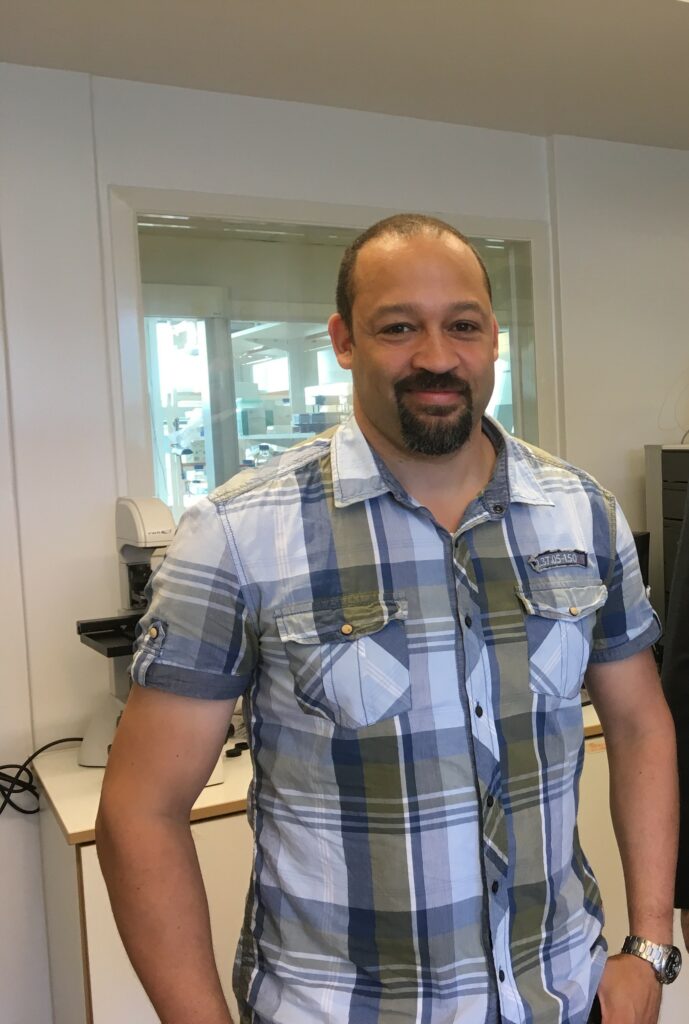
What we do
Research & development
What we do
Sprint Bioscience is a pharmaceutical company focused on developing innovative drug candidates that can contribute to new treatments for cancer. The great need for new treatments for difficult-to-treat cancer brings great commercial potential. Using a fragment-based drug development approach, we develop drug programs in a time- and resource-efficient manner that are out-licensed to global pharmaceutical companies during the preclinical phase. Sprint Bioscience has successfully entered into several global license agreements with pharmaceutical companies. These companies resource and develop the programs further into finished drugs that can be brought to market and help patients who are in dire need of new treatment options.
In the videos below, you can see Sprint Biosciences' Head of Research Martin Andersson give an insight into how we identify new starting points for our programs and Head of Business Development Anne-Marie Wenthzel tell you more about the business model and the process of finding the right partner for each individual program.
Business model
At Sprint Bioscience, we identify, launch and operate drug development programs and out-license them at the preclinical stage to the global pharmaceutical industry. This business model allows us to test the commercial viability of a program at an early stage.
When pharmaceutical programs are licensed to a customer, the license agreements typically include an up-front payment when the contract is signed, milestone payments when the program achieves certain pre-defined milestones and royalties on the sale of finished pharmaceutical product. The fact that the financing of the program is taken over by the licensee when the contract is signed reduces the capital requirement from our side. Sprint Bioscience often has a continued involvement in the preclinical development of the program, a collaboration with the licensee that generates revenue in addition to the milestone payments included in the agreement.
Licensing in the preclinical phase allows us to focus on building expertise in preclinical drug development. Once a program is licensed out and the work taken over by the licensee, new programs can be started on an existing platform, allowing us to spread risk across a portfolio of different programs rather than relying on a few.
Sprint Bioscience aims to sign on average one license agreement per year. To achieve this, new potential target proteins are continuously evaluated. The choice of focus area for new programs is set based on our internal expertise in tumor metabolism and related areas, such as immuno-oncology and factors affecting the tumor microenvironment. As Sprint Bioscience's business model is to license out programs prior to clinical trials, target proteins are selected that are covered by good scientific research with few competing drug programs.
Sprint Bioscience has from the start been focused on oncology and tumor metabolism and today the focus is on the interface between metabolism/immuno-oncology/tumor microenvironment.
Identifying potential breakthrough cancer drugs early
Generating value for patients and shareholders
Research & development
Sprint Bioscience's portfolio of drug programs is focused on different opportunities for the treatment of cancer. We aim to have a broad portfolio and are developing multiple programs simultaneously.
New programs are evaluated according to an established model. Programs that meet the set criteria move to the next stage. This is where we perform the initial experiments to determine whether molecules with good drug properties can be produced.
Programs that do not meet the requirements of medical relevance, technical feasibility or market potential are discontinued at an early stage without significant resources being expended. This means that we minimize the risk of investing significant resources on non-functioning programmes.
Our process allows us to produce molecules in a couple of months, which is significantly faster than traditional drug development. The method is resource efficient, allowing us to manage several parallel programs. By streamlining the process from idea to drug candidate, we build value in drug development.
One of the reasons we can be so efficient is that our process is based on what is called fragment-based drug discovery (FBDD). The FBDD approach is effective in identifying and developing small molecule drugs. By starting with a small molecule, a fragment, that binds weakly to the target protein, information can be gathered on how the fragment binds to the protein. This information can then be used to create larger molecules with a modified chemical structure and stronger binding profile to the target protein.
One advantage of FBDD over other methods is that several target proteins can be investigated in parallel, as the initial assays do not need to be specifically tailored for each target protein. Another advantage is that the drug molecules can be tailored, which gives control over patentability from the start.
Sprint Bioscience is engaged in drug development from idea to drug candidate ready to enter clinical trials. Our programs are licensed by pharmaceutical companies who take them through the clinic and to market.
External cooperation
The core idea behind Sprint Bioscience is our work process. New programs are launched based on published research results generated around the world. The development of the programs requires well-functioning collaborations with universities, colleges and individual researchers. We always strive to attract the very best expertise.
Through collaborations with the Academy, we can access advanced disease models that are unique and give us the best tools to test our drug candidates and find the right indications for each program.
Sprint Bioscience owns all results and rights to our research findings.
Are you interested in working with Sprint Bioscience? You are welcome to contact us - we are always open to suggestions that can contribute to the development of our programs.
Cooperation partners
Here we present our partners. Together with them, we are able to run our programs to achieve our goal - to prolong and improve the lives of those affected by cancer.

Dr. Walfridsson
Sprint Bioscience, together with Dr. Julian Walfridsson at Karolinska Institutet, is developing a methodology that can facilitate the identification of new target proteins for acute myeloid leukemia.
The collaborative project was initially awarded a research grant of SEK 2.5 million from the Swedish Foundation for Strategic Research (SSF) and has since been expanded to include the development of new target proteins that may become new programs suitable for Sprint Bioscience's fragment-based development platform.
Dr. Walfridsson is a leading expert in the field and has developed advanced model systems to study the disease.